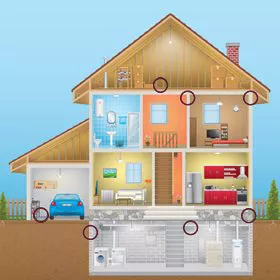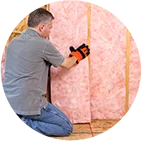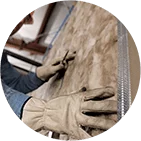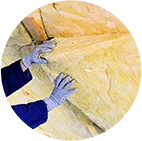Does insulation help with sound? Does wall insulation reduce noise? These are two of our customers’ most frequent questions, and it’s easy to understand why.
Today’s homes are often multifunctional, serving as living and work spaces. Outside noise can be a regular challenge in urban and high-density areas, with traffic, loud neighbors, and construction zones often interrupting daily life.
It’s no surprise that the need for quieter, more peaceful interior environments is growing. Adding insulation to your home’s walls, ceilings, floors, and attic is a terrific way to reduce airborne and impact noise levels significantly.
How Does Insulation Help Reduce Noise?
Insulation’s porous nature allows it to absorb and block sound waves, diminishing their intensity on the other side. So, sound energy is dissipated as heat instead of being transmitted through the wall, ceiling or floor. It’s highly effective in reducing the amount of sound that enters a room.
You can use insulation in various locations throughout your home to improve noise reduction. Installed between walls, it helps prevent sound from traveling from one room to another. In ceilings, insulation reduces outside noises, such as traffic or construction. And on floors, it can dampen impact noise, such as footsteps or furniture being moved around.
What Type of Insulation Is Best at Reducing Noise?
Does insulation help with sound throughout your home? Yes, but the type of insulation plays a crucial role in its effectiveness at soundproofing.
While all insulating materials offer some sound-dampening properties, certain types are more effective than others. Fiberglass, cellulose and spray foam are all excellent options, each with its own strengths and considerations.
- Fiberglass insulation is a popular choice. Its dense, fibrous structure helps absorb sound waves and reduces noise transmission between rooms or outside sources.
- Cellulose insulation, made from recycled paper products, is a dense, eco-friendly composition that effectively absorbs sound and minimizes noise transmission.
- Spray foam insulation forms an airtight seal, making it particularly useful in blocking all sounds, including from upstairs.
When choosing an insulation material, consider what you want it to accomplish. Ultimately, whether dealing with outdoor noise or sound traveling between rooms, using the right insulation can make a noticeable difference in creating a quieter, more comfortable living space. Take advantage of your insulation installer’s knowledge and expertise; they can answer all your questions.
Why You Should Choose OJ Insulation
Noise is a fact of life, but you can take steps to control it. For over 40 years, OJ Insulation has provided San Diego, Los Angeles, Santa Cruz, and San Jose County homeowners with exceptional residential insulation services. As a member of the Installed Building Products (IBP) Family of Companies, we’re experts in soundproofing homes with insulation.
We offer free home insulation estimates and are your one-stop shop for any insulation project your home needs. Contact us today to learn more or schedule services. We have the perfect insulation solution for you.
FAQs About Reducing Noise
Does Attic Insulation Reduce Noise?
Yes. Attic insulation helps decrease overhead noise, especially in homes near airports and busy roads. It absorbs and dampens sound waves, making it an effective solution for reducing outside sounds coming through the roof.
Is Wall Insulation Good for Soundproofing?
Wall insulation helps block sound from neighboring rooms or the outdoors by creating a barrier that absorbs sound waves. It reduces airborne noise, enhancing your home’s soundproofing and privacy.
Can Insulation Help With Noise from Upstairs?
Floor insulation is a great way to reduce noise between levels in multi-story homes, minimizing the transmission of footsteps, voices, or other sounds from upstairs rooms.
What is the Most Effective Insulation for Soundproofing?
Fiberglass, cellulose, and spray foam are all effective soundproofing materials. Fiberglass is affordable and widely used, while cellulose offers better density for sound absorption. Spray foam provides superior sealing but typically has a higher price tag.










